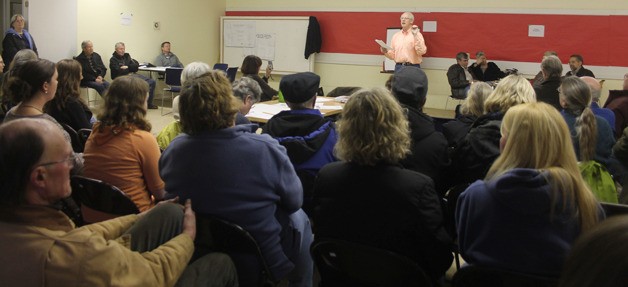People were loud and clear in their objections about a proposal to make over the Island County Fairgrounds during a meeting Wednesday night in Langley.
Originally planned by the proposal’s steering committee to be a sit-and-write your comments session, the meeting quickly careened into a public hearing of sorts over the plan to demolish, relocate and renovate the buildings and property at the fairgrounds in Langley. And the 50-plus people gathered in the Coffman Building — one of the sites tagged for demolition in the proposal crafted by Anacortes-based consultant Norm Landerman-Moore — were vocal in their opposition to many elements of the $10.12 million, 10-year plan and its perceived attempt to alter the fair’s character.
“I’ve been down here 38 years,” said Rufus Rose. “And I’ve noticed a culture shift … away from agriculture and into some suburban effort.”
At times, the meeting teetered on the edge of a shouting match, though it would have been a largely one-sided fight. The crowd demanded, and was granted the right, to be heard and not relegated to writing down their opinions and ideas without hearing from their neighbors and fellow fair supporters. Ray Gabelein Jr. called the meeting’s original structure a “divide-and-conquer tactic” used by politicians to quell upset citizens.
Gabelein disagreed with the assertion by fair management that many of the buildings were in need of serious work. He chastised Langley Mayor Fred McCarthy, who acted as the meeting’s facilitator from among the present steering committee members, for saying that the buildings were deteriorating.
“Go take a look at the buildings,” he said. When McCarthy said he had, Gabelein responded, “Then put your glasses on.”
Near the end of the meeting, which lasted more than two hours, someone asked McCarthy and the steering committee if they were going to present the proposal, as it existed, to the Island County commissioners. McCarthy said that after the strong disapproval of many elements in the plan, it was unlikely.
“I think it’s a snowball’s chance in the hot place of the steering committee presenting this plan to the county commissioners,” McCarthy said.
People were concerned with the risk presented in the proposal. One issue at the top of people’s worries was the possibility of losing the property to creditors. Under the proposal, the preferred option is to create a public development authority to oversee the property, which would be transferred from Island County to the authority. Were the Island Event Center Development Authority — the placeholder name for the managing board of directors of the property — to default on its debt incurred by the project, the 12.8-acre property could be lost.
One concern over the plan raised by Gabelein and others was the projected revenue’s reliance on parking fees. The grass lot used as RV parking south of the property would be paved and lined and then used to bring in money, and the Langley Middle School field north of the fairgrounds would be used as well, though the school district has not yet agreed to the deal. Gabelein brought up the ability of people to park plenty of places within a mile of the fairgrounds for free. He also said the idea that Whidbey Island farmers markets would all relocate and rent the Market Place facility, one of the buildings to be built in the first phase, was a stretch, noting that the Tilth Farmers Market just north of Bayview owned its farmland.
“I think the consultant missed local conditions,” Gabelein said.
Several people criticized the numbers and projections in the proposal, especially the amount of revenue that would be needed to cover the costs.
“There are only two facts in this plan,” said Jeff Lauderdale. “The first is that the fair is in trouble. The second is that a lot of people live around Puget Sound.”
Even partial supporters had serious qualms with the proposal. Lynna Baker, the co-president of the horse riding group Whidbey Western Games Association, said that even though she and other horse owners liked the prospect of a covered arena to use year-round, the loss of a grass RV lot nixed their ability to host events because the pavement was not suitable for their horses or camping. Concerns over higher rental rates were also shared by Baker, who said she was displeased with the proposed covered horse arena’s reduction.
“Horse people, we spend money,” she said, adding: “We can’t just raise the rates.”
For all the disagreement over parts of the plan, steering committee member and Langley business owner Paul Schell summed up the one unifying theme of the plan’s proponents and detractors: the fairgrounds and fair management need aid.
“What exists right now is the agreement that the fair needs help,” Schell said.


